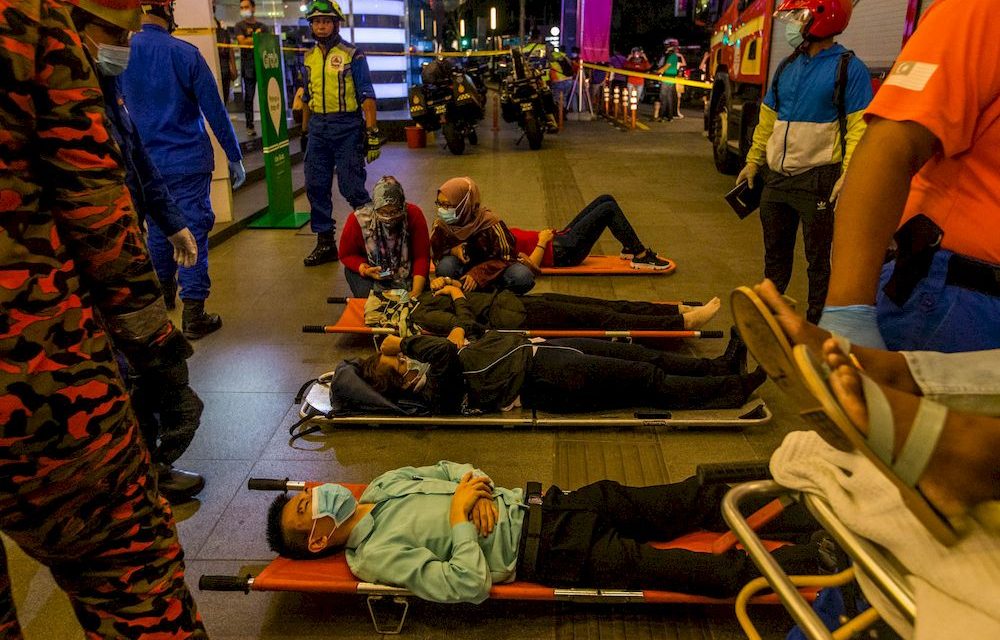Probe to take place immediately after LRT crash injures over 200 passengers
A head-on collision involving two LRT trains between Kampung Baru and KLCC occurred last night, leaving 213 people injured, 47 of them seriously. Transport Minister Datuk Seri Dr Wee Ka Siong said the authorities have launched an investigation into the accident that took place underground at 8.45pm. Dang Wangi OCPD Asst Comm Mohamad Zainal Abdullah said that 47 individuals suffered serious injuries and 166 were lightly injured. “I view this accident seriously and I have ordered the Transport Ministry and Prasarana Malaysia Bhd to conduct thorough investigations in order to ascertain the cause of this accident, and stern action will be taken immediately,” said Prime Minister Tan Sri Muhyiddin Yassin. It is understood that one of the trains involved in the collision was not under passenger service, and was being manually driven, though the Kelana Jaya line runs on a fully-automated mode under normal passenger service. This is the first such accident in over 23 years of the LRT operating in Malaysia. The Kelana Jaya line was the first fully automated metro line in Malaysia when it opened in 1998. (The Star)

MySejahtera app to keep track of two-hour shopping limit
The two-hour shopping time limit on retail premises will be monitored through the MySejahtera application, said Domestic Trade and Consumer Affairs Minister Datuk Seri Alexander Nanta Linggi. He said the MySejahtera application records the exact time a customer enters the premises and this would facilitate the ministry’s personnel or staff members of the outlet to conduct checks if necessary. Yesterday, Nanta announced that customers are only allowed to spend a maximum of two hours on retail premises, including shopping malls, in addition to limiting the number of customers inside the premises at one time. The enforcement of the SOP is in line with the implementation of MCO 3.0 today. Nanta said the ministry’s enforcement officers would conduct random checks at popular retail outlets to ensure that the people comply with the SOPs. (The Edge)
Sarawak unveils long-term development plans for Kapit
A total of three long-term development plans have been laid out for Kapit Division in Sarawak. According to a statement from the Deputy Chief Minister’s office, the overall development plan comprises the proposed Master Plan for Kapit town, the Bakun Lakefront Township and Island Resort Local Plan as well as the Master Plan for Belaga. The Master Plan for Kapit town proper will be more to a pedestrian town. For Bakun, the statement said the proposed local development plan takes into consideration its infrastructure, culture and environmental impact. Meanwhile, the Master Plan for Belaga town will address the issues of obsolete government buildings and the lack of public facilities. “This is a long-term development plan that can span up to 30 years ahead and we hope to address the dire problem of connectivity and access in terms of infrastructure and telecommunication through these development plans,” said Deputy Chief Minister Tan Sri Datuk Amar Dr James Jemut Masing, who is also Minister of Infrastructure and Ports Development. (Malay Mail)
Rich people snap up properties during pandemic
Real estate technology group, Juwai IQI, said its new home sales increased by 293% year-on-date despite the impact of the Covid-19 pandemic. Its transaction data noted the figure was 247% higher versus the same period in 2019. Juwai IQI group co-founder and CEO Kashif Ansari said, paradoxically, many people viewed the pandemic period as a good opportunity to buy houses. Many have built up more savings during the movement restrictions and want to invest in property as a result. “Property buyers see owning real estate as a relatively low-risk way to build a financial cushion. Most Malaysians are still earning their income but are not spending as much as before the pandemic. Many are using the money for down payments on a property instead,” Kashif said. He said observers expect economic, employment and income growth to increase more rapidly post-pandemic than the pre-Covid-19 rate. He added low interest-rates, the reintroduction of the Home Ownership Campaign (HOC) and various other property-related initiatives in the Budget 2021, including the short-term National Economic Recovery Plan, have fuelled property demand. (The Malaysian Reserve)
Malaysia hotel industry suffers RM6.53bil losses last year – MAH
The Malaysian hotel industry has suffered losses of over RM6.53 billion in 2020 and estimated loss of RM300 million for every two weeks of movement control order period, said Malaysian Association of Hotels (MAH). With the reinstatement of movement control order this year, the association predicted the loss of revenue for 2021 could easily add up to RM5 billion. “The government needs to understand that as long as travel restrictions are in place and both domestic and international borders are closed, the tourism and hotel industry will not survive, regardless of total lockdown or not. Government cannot turn a blind eye to this fact anymore. The lives of 3.6 million people employed in the industry, or what’s left of it by now, is at stake here,” stressed MAH. Limiting attendance at the workplace and operation hours of economic sectors will only prolong the situation, said the association. MAH has over 1,000 hotel members spread across 13 chapters and partnerships with both the private sectors and Government such as with the Ministry of Tourism, Arts & Culture (MOTAC) of Malaysia. (The Edge)





